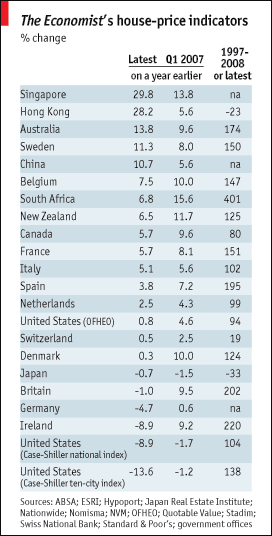Ok, not really.
Last month I did an interview on BBC Radio and the producer said the interview was based on the old adage that “when America sneezes, the world catches a cold.”
There was a pretty interesting article in The Economist, which has been a housing bear since 2003, called Structural cracks: The pain in Spain falls mainly on Mr Drains
Other than trying to get the inner meaning of the title, the chart clearly shows that the countries on the list are performing differently or are in different phases of their respective cycles.
So in a global sense, housing is local after all?
It is, but there are a heck of a lot of local markets that comprise the global housing market.
Some locales that stood out to me:
Singapore and Hong Kong are doing well lately while Japan and Germany are not.
>Both Spain and Ireland have parallels with the American housing market, where the inventory of unsold homes has hit a 20-year high, according to Capital Economics. There the pace of price decline, as measured by the S&P/Case-Shiller indices, has been accelerating.
Monetary policy is changing across the globe, weakening buying power like it is in the US. Because (insert tired phrase here:) when America sneezes, the world catches a cold.
Or something along those lines…
>If house-price weakness does spread more widely, there may be important economic consequences. There is plenty of debate about the size of the “wealth effect” of higher property prices on consumer demand. But it will hardly help that fuel and food prices are soaring at the very moment when the value of bricks and mortar looks about to sag.
One Comment
Comments are closed.



Good article. This is a disruptive economy that makes one peer into the future to see where people will gather. I am thinking a repopulation of cities and farms.